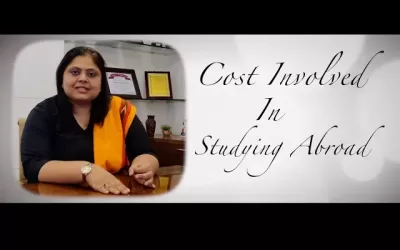 Budget-Savvy Adventures: How to Save Money While Studying Abroad
Budget-Savvy Adventures: How to Save Money While Studying Abroad
Ms. Kunjal Sakhrani talks about how to save money while studying abroad. The main cost which will be involved is going to be the tuition fees. There is nothing much we can do to reduce the fees but students can maintain good academic records and can avail good scholarships.
Also, remember that universities offer a small discount if the entire course fee is paid upfront. So you can take advantage of that also.
Studying abroad – Part-Time Job
There are lots of Part-time jobs that can also help you take care of a few expenses, like food, travel, or even some entertainment. The living costs can be reduced if you share your accommodation and also it will help you share your other expenses like rent, gas, electricity and water bills.
Remember that you can save a lot by cooking your own meals. The other major expense that you will have is your books. An easy way of saving money here is to buy books at second-hand stores or from your seniors. You can also utilize student discounts, especially on public transport to reduce your day-to-day expenditure.
Living alone abroad teaches you vital skills for managing your money and makes you financially responsible.
Frequently Asked Questions (FAQs) for saving money while studying abroad:
1. Why is it important to save money while studying abroad?
Saving money while studying abroad is crucial because it helps you manage your expenses and ensures that you can fully enjoy your international experience without financial stress. It allows you to make the most of your time abroad and avoid accumulating debt.
2. How can I create a budget for studying abroad?
To create a budget, start by listing all your expected expenses, such as tuition, housing, food, transportation, and entertainment. Then, compare these expenses to your available funds and allocate specific amounts to each category. Regularly track your spending to stay within your budget.
3. What are some strategies for finding affordable accommodation abroad?
Consider options like university dormitories, shared apartments, or homestays, which are often more affordable than private apartments or hotels. You can also explore housing options in less expensive neighborhoods or suburbs and use student housing services provided by your host institution.
4. How can I save money on food while studying abroad?
Opt for cooking your meals instead of eating out frequently. Buy groceries from local markets and cook with roommates to share expenses. Look for student discounts or meal plans offered by your host institution. Additionally, try to explore local cuisine, as it can be more budget-friendly than familiar international chains.
5. Are there scholarships or financial aid options for students studying abroad?
Yes, many universities and organizations offer scholarships and financial aid specifically for students studying abroad. Research and apply for these opportunities well in advance to help cover your expenses.
6. How can I save on transportation costs while abroad?
Utilize public transportation options like buses and trains, which are often more cost-effective than taxis or rideshares. Consider purchasing transportation passes or cards for discounts on regular fares. Also, explore options like walking or biking for short distances.
7. What are some tips for saving on travel and leisure activities?
Look for student discounts on museums, attractions, and entertainment venues. Plan group trips with fellow students to share expenses. Prioritize free or low-cost activities like hiking, exploring local parks, and attending community events.
8. How can I handle currency exchange and banking while studying abroad?
Choose a bank with international branches or partnerships to reduce foreign transaction fees. Consider opening a local bank account to avoid excessive fees when withdrawing cash. Use currency exchange apps or prepaid travel cards to get favorable exchange rates.
9. Should I get international health insurance while studying abroad?
Yes, it’s highly recommended to have international health insurance while studying abroad. It ensures you’re covered in case of illness or emergencies and can prevent unexpected medical expenses.
10. What should I do if I face financial challenges while studying abroad?
If you encounter financial difficulties, first speak with your university’s international office or a financial advisor. They can provide guidance and resources to help you manage your situation. Additionally, consider part-time work opportunities, but ensure they comply with your visa regulations.

 Budget-Savvy Adventures: How to Save Money While Studying Abroad
Budget-Savvy Adventures: How to Save Money While Studying Abroad




